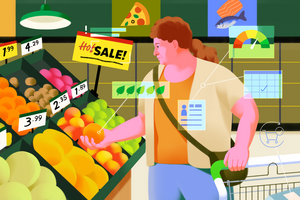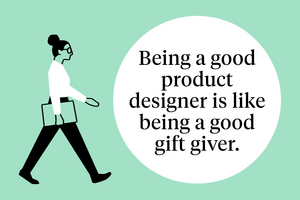Marketing Nov 3, 2014
It’s Not About You. It’s About Me.
Scarcity can drive us to altruism—when it serves our own interests

The Golden Rule—treat others the way you would like to be treated—hints at a connection between altruism and self-interest. Be moral in your dealings with others, it suggests, and you might receive the same in return.
It is especially important to keep this connection in mind during times of economic hardship, according to research by Kelly Goldsmith, assistant professor of marketing at the Kellogg School. Goldsmith and her coauthors, Kellogg alumnae Caroline Roux of Concordia University and Andrea Bonezzi of New York University, find that when people believe resources are scarce, they are more inclined to be selfish.
“We consistently find that when people encounter reminders of resource scarcity, their next move is to put themselves first—in front of others,” Goldsmith says.
“But we want people to pay their taxes,” she continues, “which is a prosocial behavior. Taxes build roads and bridges that benefit everyone. We want people to donate to charity. We want people to give in blood drives and to buy green products.”
So what’s a public policy maker—or a marketer of eco-friendly laundry detergent—to do?
One strategy might involve doubling-down—highlighting how low blood donations are running or the finiteness of our natural resources. The hope here is that fear will provoke generosity.
“What our research strongly indicates,” Goldsmith says, “is that if there is a climate of scarcity, you should really emphasize the personal benefits of the behavior that you want to promote.”
But instead, “what our research strongly indicates,” Goldsmith says, “is that if there is a climate of scarcity, you should really emphasize the personal benefits of the behavior that you want to promote.” In other words, you should make people believe there is something in it for them, if you want them to do it.
Charity Begins at Home
Goldsmith’s research was motivated by a flood of news reports about scarcity—from the economic hardships experienced by low- and middle-class workers in the wake of the recent recession to the skyrocketing global demands for dwindling natural resources. “We are just bombarded with information about all the things the world was running out of,” she says. This got the researchers wondering: “How does living in this day and age of scarcity affect our consumption behavior?”
“Once we began reading about it,” says Goldsmith, “we realized that scarcity has these conflicting effects. Scarcity can lead you to put your own needs first, which is a logical prediction. But other literature suggested that when the world is running out of resources, that’s when we really band together.”
To address the discrepancy, Goldsmith and her colleagues designed a series of six experiments. In one, particpants were allowed to allocate money to either themselves or to an anonymous other person. Those who had just described a situation where resources were scarce were likelier than other participants to allocate the money to themselves.
But another experiment established that thinking about scarcity can increase generosity—so long as we’re reminded that generosity can be in our own best interest. Participants were likelier to “thank” a classmate with a gift when they were reminded that the gift might endear them to the classmate, who might then be more inclined to help them with their next homework assignment.
This relationship between selfishness and altruism offers perhaps an uneasy truth about human nature, but it is one to which marketers and policy makers should nonetheless pay attention.“By understanding these psychological mechanisms, we can take advantage of them,” Goldsmith says. “If I buy a green product because it’s going to save me money, or because it’s better quality, I’m still buying a green product that will use less energy. So there’s still a benefit to the world.”
Seeing the Big Picture
Researchers are just beginning to understand the impact of the scarcity mindset. One thing we do know is that scarcity shapes how consumers value specific products. “If you signal that a product is in limited supply,” says Goldsmith, “people will want to pay more for that product. People want things that are scarce. If you tell me that the world is running out of gas, will I pay more for gas? Sure.”
But might our response to gas scarcity affect how generous we are in other contexts—say, with our money and time? That question is particularly pressing as the tension between environmental awareness and consumption patterns grows more urgent. The scarcity mindset provoked by prominent coverage of water shortages in California and other parts of the West, for example, might motivate behavior that makes the problem worse—causing people to be more selfish rather than cooperative, and not only in the realm of their water usage.
“Given that we’re still living in a time in which we’re constantly being reminded of the things we’re running out of,” Goldsmith says, “it’s important to understand that those reminders can have carryover effects on unrelated behaviors. I think this paper raises more questions than it answers, in a good way. The experience of scarcity is fundamental to human existence, and knowing how to manage it is essential for survival.”
Artwork by Yevgenia Nayberg.
Roux, Caroline, Kelly Goldsmith, and Andrea Bonezzi. 2014. “On the Consequences of a Scarcity Mindset: Why Thoughts of Having Less Can Lead to Taking (and Giving) More.” Conditionally accepted at the Journal of Consumer Research.



